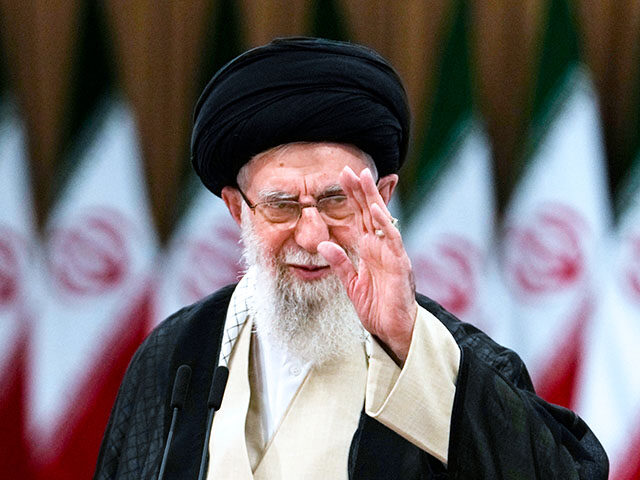Iranian tyrant Ayatollah Ali Khamenei named India in a statement condemning “enemies of Islam” on Monday, equating the situation of Indian Muslims to that of Palestinian Muslims in Hamas-occupied Gaza.
The statement, published on the social media site Twitter (X), called for Muslims not to be “oblivious to the suffering that a Muslim is enduring” in India, as well as Gaza and Myanmar, currently governed by a military junta that has attempted to garner public support by aligning itself with prominent Buddhists.
The Indian government responded to Khamenei by calling his statement “misinformed and unacceptable” and alluding to Iran’s atrocious human rights record, including widespread abuses against Muslims living under the Islamic theocracy.
The spat is notable as Iran and India elevated their diplomatic relations thanks to Tehran joining the BRICS coalition, of which India is a founding member. Brazil, Russia, China, and South Africa joined India among the original members of the anti-American coalition; Iran became a member in January alongside the United Arab Emirates, Egypt, and Ethiopia. Saudi Arabia, Iran’s top geopolitical rival, appeared to have accepted the invite to join BRICS but its official membership status is unclear at press time.
BRICS membership opens both economic and diplomatic doors for new members. India and Iran recently cemented a lucrative port development deal and appeared interested in increasing the trade volume between themselves prior to Khamenei attacking India’s Hindu nationalist government. The countries have struggled to find points of mutual agreement, however, given Iran’s support for radical Islamist terrorism throughout the Middle East and India’s longstanding friendly relationship with the United States, which Tehran regularly refers to as the “Great Satan,” and with Israel, which Iran has threatened to destroy.
Khamenei made the remark against India in a post to Twitter in the greater context of encouraging Muslims to oppose Israel’s self-defense operations against the Iran-backed terror group Hamas in Gaza. Iranian officials claim the self-defense operation is a “genocide” against Muslims in the territory.
“The enemies of Islam have always tried to make us indifferent with regard to our shared identity as an Islamic Ummah [community],” Khamenei’s account posted. “We cannot consider ourselves to be Muslims if we are oblivious to the suffering that a Muslim is enduring in #Myanmar, #Gaza, #India, or any other place.”
The statement appeared to be related to remarks Khamenei made on Monday to open “Islamic United Week,” which coincides with the alleged birthday of Muhammad, the prophet of Islam. Khamenei’s official website posted a similar summary of his remarks on Monday but without any mention of India.
The Indian External Affairs Ministry swiftly replied to the statement, expressing that Indian officials “strongly deplore” the suggestion that it is repressing Muslims.
“These [statements] are misinformed and unacceptable. Countries commenting on minorities are advised to look at their own record before making any observations about others,” the ministry added.
Under current Hindu nationalist Prime Minister Narendra Modi, India has experienced significant violence between groups of Hindu nationalists, who insist that all those of Indian blood must follow the Hindu religion, and non-Hindu religions in the country. Some of that conflict has been with Muslims, including Hindu mob attacks on known Muslim enclaves. Modi has done little to quell opposition to Islam in India, referring to Muslims as “infiltrators” during a campaign stop in April, but Hindu mob violence has not been limited to Muslims. Christians, often from lower-caste communities, have faced outsized violence, including prominent abhorrent incidents such as a Hindu mob raping multiple Christian women in public in northern Manipur in July 2023 and parading them through the streets naked.
In Iran, Muslims – particularly those who do not follow the specific fundamentalist Shiite interpretation of Islam the regime imposes – also face significant persecution. Muslim women, in particular, have been beaten to death for allegedly wearing their hijabs incorrectly and other similar “crimes.”
India and Iran have few items of their geopolitical agendas aligned, making their integration in the context of BRICS particularly difficult. India has avoided buying Iranian oil as a result of American sanctions on the Iranian oil industry and, as a Hindu nationalist government, has been among the most vocal in its region to condemn radical Islamic terror. The different in approach was particularly stark after the Hamas attack on Israel on October 7, which Iran celebrated as the “al-Aqsa flood” while India condemned as “worse than ISIS.”
“Hamas has hijacked the Gaza strip and is worse than ISIS. They started it so we can’t say people from both sides have been killed,” a spokesman for Modi’s Bharatiya Janata Party (BJP), RP Singh, said in the immediate aftermath of the October 7 attack.
Modi himself declared that India’s people “stand firmly with Israel in this difficult hour.”
Those statements preceded Iran’s entry into BRICS, but Iran had already begun to receive invitations to BRICS events and attempt to use its leverage to turn the entire coalition against Israel. In November, Iran’s president at the time, Ebrahim Raisi, reached out to Modi personally in a what now appears to have been a failed attempt to convince him to support the jihadist cause against Israel.
“Terrorist incidents, violence and loss of civilian lives are serious concerns,” Modi said following the call. “Preventing escalation, ensuring continued humanitarian aid and early restoration of peace and stability are important.”
India nonetheless announced in May that it had signed an agreement to help develop Iran’s Chabahar port – a project that would take at least a decade to complete and significantly boost Iran’s ability to ship its oil globally. The U.S. State Department warned after the announcement that the deal may violate American sanctions, though Washington has taken no actions against India at press time.
Follow Frances Martel on Facebook and Twitter.

COMMENTS
Please let us know if you're having issues with commenting.